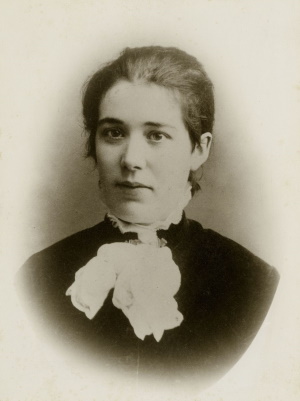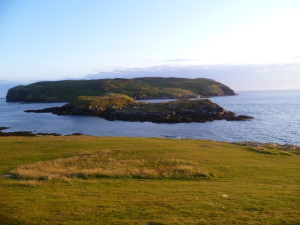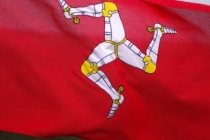Sophia Morrison’s Manx Fairy Tales: The story of Baron Kitterland whose reckless behaviour was stopped by the wise Manx Witch

The Manx nation has a rich cultural heritage and folklore. The Celtic myths, legends, traditional beliefs, customs, and stories of the Isle of Man (Mannin) have been passed from generation to generation, much of it through oral tradition. The importance of folklore to a nation should not be underestimated. It encompasses the traditions common to that culture and shared by its people.
Many entities exist in Manx mythology. Creatures that can rise from the rivers and the sea, emerge from cavernous depths and spring out of rocks. Variations of stories featuring each of these mysterious beings have been told on the Isle of Man for many centuries.
Sophia Morrison (24 May 1859 – 14 January 1917) was a Manx cultural activist, folklore collector and author. She saw the importance of what it meant to be Manx and helped record and identify the different features that make up Manx culture. In Preface to Manx Proverbs and Sayings, 1905, which she co-authored with Carl Roeder, Sophia Morrison wrote:
Something of the national Character, somewhat of the history of a people, much of its manners and customs, may be gleaned from its folklore.
She worked tirelessly to preserve intact the native Manx language and literature, folk-song and folk-lore. In her book of Manx Fairy Tales, first published in 1911, she told the stories that had been collected from ordinary people in the Isle of Man. The popularity of Manx Fairy Tales received a further boost, sadly after her death, by a second edition in 1929, with the addition of new stories illustrations by Archibald Knox.
Sophia Morrison was also a Manx political campaigner who saw the Manx Gaelic language as an extremely precious heritage. In 1899 she was one of the founding members and secretary of Yn Cheshaght Ghailckagh (The Manx Language Society). She was also pivotal in the development of the Pan Celtic movement and the Celtic Congress. Prior to 1917 the Celtic Congress had a significant political aspect. As respected historian and author Peter Berresford Ellis writes in his book The Celtic Dawn:
Members (of the Celtic Congress) were pledged to the revival of each Celtic language and to some degree of ‘official status’. Because of this, the early Celtic Congresses had a political hue. Indeed, the very act of speaking a Celtic language, let alone campaigning for its status, could be interpreted as an act of political expression when the Imperial government were actively discouraging the languages as a continuing part of their centuries-old policy of destroying them.

Taken from her book Manx Fairy Tales here is the story of Kitterland. Kitterland (Manx: Famman Kitterland) is an islet in the Calf Sound (Manx: Yn Cheyllys) between the Isle of Man (Manx: Mannin) and the Calf of Man (Manx: Yn Cholloo) in the Irish Sea. The Calf of Man is a 618-acre island, off the southwest coast of the Isle of Man and the word 'calf' derives from the Old Norse word kalfr which means a small island lying near a larger one. The Calf of Man is owned by Manx National Heritage (Manx: Eiraght Ashoonagh Vannin) and managed as a bird sanctuary under the care of the Manx National Trust. Legend has it that the islet of Kitterland was named after the Norwegian Baron Kitter who was said to have once ruled the Isle of Man. Having hunted many of the animals on the Isle of Man, Kitter went to the Calf of Man where he was said to have hunted the animals to extinction. The alarmed Manx people turned to the wisest of Manx witches Ada to seek help in ridding the island of Baron Kitter. The result was the death of Kitter on the small islet which now bears his name.
Manx Fairy Tales: Kitterland
It was more than eight hundred years ago, in the days of Olaf Goddardson, that Baron Kitter, the Norwegian, lived in Mann. He had his castle on the top of Barrule, and he spent all his time in hunting the bisons and elks that were on the island then, until he had killed them all. Then the people began to be afraid that he would chase their cattle and the purrs of the mountains, and leave them no beasts at all, so they went to the wisest witches of the island, to see what they could do.
One day Baron Kitter had gone over to the Calf to hunt the red deer there, leaving his cook, Eaoch of the Loud Voice, in the castle to cook his dinner. Eaoch set the pot on the fire and then fell asleep over his work. While he was sleeping the witch-wife Ada put a spell on the pot, and the fat boiled over into the fire. Soon the house was in flames. Eaoch woke and shouted for help at the top of his voice, and his cries were so loud that they reached the ears of Kitter and his fellow huntsmen, ten miles away on the Calf.
When Kitter heard the cries and saw the flames on the top of Barrule, he made for the beach as hard as he could, and put out in a small currach for the island, with most of his friends. When they were in the strong current about half-way across the channel, the boat struck on a rock and they were all drowned, and the rock has ever since been called Kitterland.
The rest of Kitter's friends, who had stayed on the Calf and so saved their lives, believed that Eaoch, the cook, had made a plot with the witches of the island to do away with all the Norwegians in Mann, so they brought him before King Olaf to be judged, and he was condemned to death. But according to the custom of Norway, he was allowed to choose how he would die.
Then he said:
'I wish my head to be laid across one of your Majesty's legs, and there cut off by your Majesty's sword Macabuin, which was made by Loan Maclibuin, the Dark Smith of Drontheim!'
It was known to every person there that the king's sword could cut the hardest granite, only by touching it with its edge, and they all begged Olaf not to do as crafty Eaoch asked. But the king would not break his word and gave orders that all should be done as the cook had said.

But the witch Ada was there and she told them to take toads' skins, twigs of the cuirn tree, and adders' eggs, nine times nine of each, and put them between the king's leg and the cook's head. They did this, and then the great sword Macabuin, made by Loan Maclibuin, was lifted with the greatest care by one of the king's faithful servants and laid gently on the cook's neck, but before it could be stopped Eaoch's head was cut from his body and the adders' eggs and the cuirn twigs were also cut through- only the toads' skins saved the king's leg.
When the Dark Smith heard how the power of the great sword Macabuin had been stayed by witchcraft, he was very angry, and called for his Hammer-man, Hiallus-nan-urd, who had lost one leg when he was helping to make the sword. He sent him off at once to Peel Castle to challenge King Olaf, or any of his men, to a walking race from Peel to Drontheim.
King Olaf himself took up the challenge, and off they set. Over mountains and through gills they walked, as fast as they could go, and the one-legged man as fast as the king. When they had crossed the island they each put out to sea in a sailing boat, and each came in sight of Drontheim at the same moment. When they drew near to the smithy, the Hammer-man, who was ahead, called out to Loan to open the door, and Olaf called to him to shut it, and then, pushing past Hiallus, got into the smithy first.
To show that he was not at all weary after his walk Olaf took up the great hammer of the forge and struck the anvil such a mighty blow that he split it through, and the block beneath it, too. When Emergaid, the daughter of Loan, saw the strength and power of Olaf, she loved him; and while her father was putting back the block and anvil, she whispered to the king: -
'My Father is doing that, so that he may finish the sword he is making. It has been foretold that the first blood it shall shed shall be royal blood, and he has sworn that that blood shall be yours.'
'But is not your father the seventh son of Old Windy Cap, King of Norway?' cried Olaf.
'He is,' said Emergaid.
Then the prophecy shall be fulfilled,' said Olaf, and he thrust the sword into the heart of Loan, and afterwards slew with it the Hammer-man also
He made Emergaid his queen and they ruled together, and from them came a longline of Kings of Mann.
Source: Sophia Morrison - Manx Fairy Tales, London 1911
Content type:
- Manx
Language:
- English






